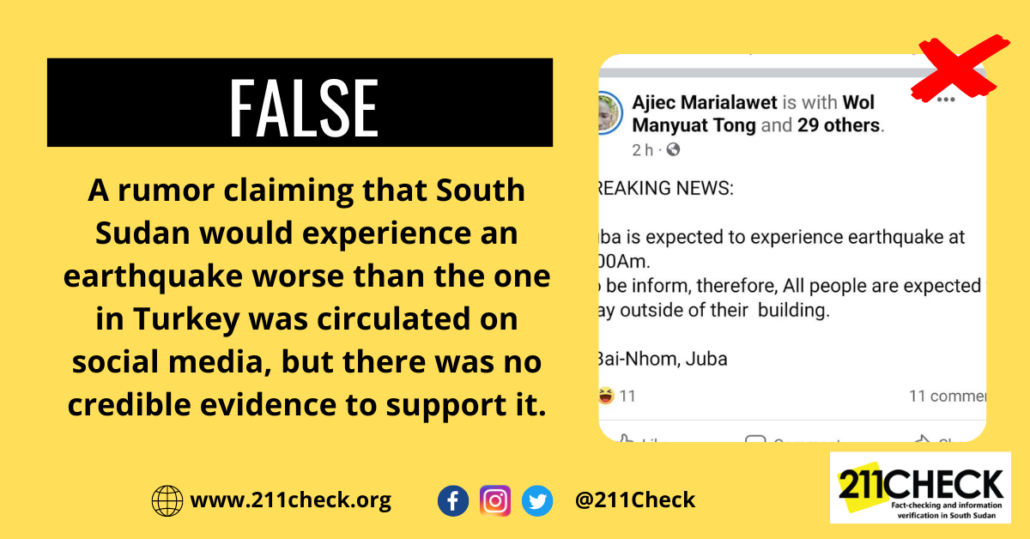Fact-check: Rumor of an earthquake in South Sudan debunked; no seismic activity recorded
A rumor claiming that South Sudan would experience an earthquake worse than the one in Turkey was circulated on social media, but there was no credible evidence to support it.
Writer: Emmanuel Bida Thomas
On the night of February 27th, a rumor began circulating on social media platforms, including Facebook and WhatsApp, that South Sudan was about to experience an earthquake worse than the one that hit Turkey. The rumor that was shared here and here instructed people to stay outside of their buildings to avoid harm. However, there was no earthquake in South Sudan last night, and no credible media reports suggest otherwise.
It is crucial to rely on credible sources of information and avoid spreading rumors that can lead to dangerous situations. In this case, a South Sudanese researcher quickly dismissed the rumors, stating that there was no threat of an earthquake and that the rumors were unfounded. People should always look to official sources for information during times of crisis, such as government agencies and reputable news outlets.
“People should panic only with scientifically informed communique regarding any natural disaster,” M. Ajang Mathiang, Research Assistant at Telolink Technology, said in a Facebook post.
There were no significant confirmed earthquakes in or near South Sudan in the past 24 hours, according to Earthquake Track and VolcanoDiscovery.
3.4- the strength of tremor felt in Juba on February 25, 2022 on the Richter scale.
4.5- the strength of the tremor felt in Torit on 25 February 2022 on the Rickter scale.
3.8- the strength of tremor felt in Juba in December 2021 on the Richter scale
7.5- the strength of tremor felt in South Sudan in 1990
Can an earthquake be predicted or told beforehand?
According to various sources here, here, and here, earthquakes cannot be accurately predicted. Seismologists can only estimate where and when earthquakes may be likely to occur by calculating probabilities and forecasts based on past seismic activity425.
However, seismologists use seismographs to detect and record earthquakes as they happen. They also study fault lines to see how ancient earthquakes have shaped the Earth’s crust.
Rumors and false information can spread quickly on social media, causing panic and fear. It is essential to verify the accuracy of such information before spreading it to others, especially during times of crisis. In this case, the rumor caused unnecessary fear and anxiety among the South Sudanese population, who spent the night outside their homes anticipating an earthquake that never occurred.
Conclusion:
The rumor that South Sudan was about to experience a devastating earthquake worse than the one that hit Turkey last night is false. No credible media reports suggest otherwise. It is crucial to rely on verified sources of information and avoid spreading rumors that can cause unnecessary fear and panic. By doing so, we can help ensure that people stay safe and informed during times of crisis.
Fight misinformation on mainstream and alternative media by not being a victim of fake news. Refrain from sharing content you are unsure about or don’t know where it comes from to prevent spreading false information. For more information on our fact-checking process, visit https://211check.org/ or send us a WhatsApp message at +211 917 298 255 to present a claim. Our team will fact-check it and respond promptly. #FactsMatter.




 211 Check
211 Check 



Leave a Reply
Want to join the discussion?Feel free to contribute!